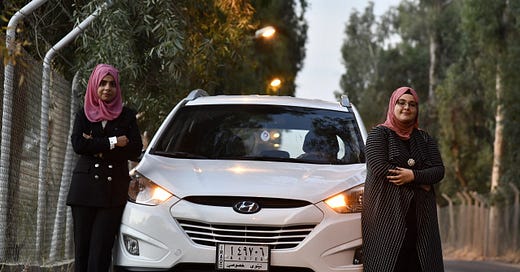Driving Change: Lygo is Shifting Gears with a Women-Only Taxi Service
Lygo is empowering women in Mosul by providing them with safe and socially acceptable transportation.
At first, it was difficult to find female taxi drivers in Mosul. Many families in Iraq’s conservative second city do not allow women to work, let alone as drivers. But in the past few months, female-driven taxis have become a familiar sight, ferrying women to university in the morning, or collecting them from work in the afternoons, addressing a glaring gap in transport options for half the city’s population.
“It’s a revolutionary idea,” says Hesham, who recently launched Lygo, a new taxi service staffed by female drivers, which he hopes will transform travel and improve freedom of movement for women in Mosul.
He has witnessed firsthand the frustration felt by women forced to forgo education and employment opportunities because they lack transportation. Ride-hailing companies like Uber, Bolt and Careem don’t operate in Mosul, and there’s no public transport in the city. “If a woman doesn’t have a car, or one of her male relatives doesn’t, she cannot go anywhere,” Hesham explains.
The idea came to him after his friend failed to show up to a hackathon. “She said there was nobody to take her there and she couldn’t use a taxi became females cannot share a car with men they do not know,” he says. His plan is to open the city up to women as it embraces a new era after the trauma of the Isis occupation between 2014 and 2017.
Recovery has been slow, but there have been signs of progress that fill Hesham with hope. Reconstruction is finally moving forwards, including on the city’s airport, signaling an intention to open up to the world once again. “Optimism is everywhere, we have big events attended by singers and artists from all over the country,” Hesham says.
Demand has been consistently high since he launched Lygo and he is already eyeing expansion. Most mornings and afternoons his taxis are fully booked, primarily by university students traveling to and from class. “At the moment demand is much greater than supply. We get tons of calls,” he says.
Unlike regular taxis, Lygo enables women to book from home so they don’t have to wait on the street. It also affords a sense of security for women who prefer traveling with a female driver. “It’s more socially acceptable, safe and convenient,” Hesham explains.
Not everyone supports the idea. There has been pushback from male taxi drivers who feel threatened by the new competition. “They have started spreading rumors, saying these women can’t drive, they will cause accidents and problems,” says Hesham. Some men started creating fake profiles and putting through bogus orders to disrupt their service.
But there has also been a lot of support from the women of Mosul, as well as human rights activists and organizations, including Ideas Beyond Borders, which has provided an Innovation Hub grant to fund the creation of the Lygo app.
The next step, says Hesham, is to expand the fleet and become the official airport taxi for female travelers. At present, most of their customers are local, but Hesham is confident that the transformation taking place in Mosul will encourage more people to visit the city and when they do his drivers will be waiting to collect them.






